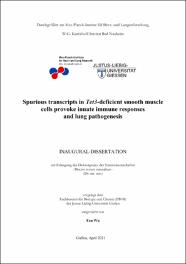| dc.description.abstract | Initiation of transcription at the regular start site is critical for the generation of functional transcripts, preventing production of aberrant and potentially hazardous aberrant RNAs. Here, we demonstrate that TET3, which converts 5-methylcytosine (5mC) to 5-hydroxymethylcytosine (5hmC) and other oxidized derivatives, restrains aberrant initiation of transcription in smooth muscle cells (SMCs) by blocking intragenic entry of RNA Polymerase II pSer5. Loss of TET3-dependent 5hmC formation in gene bodies of highly expressed SMC genes results in accumulation of spurious transcripts, which activate the endosomal nucleic acid-sensing TLR7/8 signaling pathway and promote phenotype switching from the contractile to the secretory synthetic state. SMC-restricted inactivation of Tet3 initiates innate immune responses in the lung, provoking massive inflammation and airway remodeling, resembling human asthma bronchiale. Correspondingly, we detected a substantial decline of 5hmC levels in human asthma airway samples. Disruption of mechanisms preventing spurious transcription might be important to instigate or maintain chronic inflammation. | de_DE |



